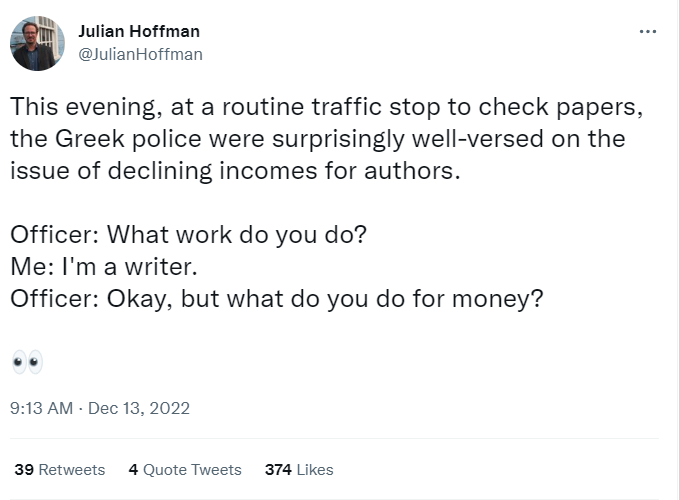Is it possible for freelance writers to beat the rap of “starving artists”?
This article is written by Vanessa Chiasson, a freelance writer based in Ottawa who specializes in travel and human interest stories.
Freelance writer Julian Hoffmann got a lot of laughs recently when he Tweeted the following:
This evening, at a routine traffic stop to check papers, the Greek police were surprisingly well-versed on the issue of declining incomes for authors.
Officer: What work do you do?
Me: I’m a writer.
Officer: Okay, but what do you do for money?
Hoffmann’s encounter was funny but worrisome. Is it possible for freelance writers to beat the rap of “starving artists”?
It’s a question I’ve been asking myself a lot in the last few months. In 2022, I made a vow to negotiate every assignment. It was a worthwhile project and 68 per cent of my work benefited from my willingness to ask: “Is there any wiggle room in the budget?” But when I added up my earnings I found that I increased my income by less than $2,000.
How could I have been so successful yet fruitless at the same time? It all comes down to the base rates upon which I was negotiating. In many cases, they were so paltry that no amount of bargaining would have netted a reasonable income. How could I determine fair value—and my value—going forward?

For financial literacy councillor Pamela George, freelance success starts with knowing your worth—but to get there, you need a bit of education. She points out that even a lucrative assignment might not be as good as it seems, adding that you’d be lucky to keep 50 per cent of what you make. You have to pay taxes on your income and that means setting aside a good chunk of money from each client. It also means accounting for expenses, from pens and pencils to conference fees. She advises people to ditch the starving artist mentality and instead to brush up on their financial literacy skills to know in very concrete terms what kind of rates it will take to support their lifestyle.
Entrepreneurship coach Lara Wellmen points out that identifying big financial goals brings additional benefits, even when it’s difficult to step outside your comfort zone. She says,
“Asking for more, no matter how reasonable it is, can feel bold and pushy—and we’ve taught not to be those things (especially women!) Stepping through the discomfort to advocate for yourself not only might mean a bit more money in your pocket, but it’s the first step in showing you that things that feel difficult can be easier than you thought, and that they’re worth the effort. It’s empowering and builds confidence, and those two things are what it’s all about when it comes to having built a business and life that feels good.”
George and Wellman’s combined wisdom is going to drive my financial planning for the coming year. I will still negotiate every freelance assignment but I’m going to start with publications that pay higher base rates. It’s daunting, to say the least. But I also know that I’m building a life of empowerment, not just a bank account. A year of negotiating has taught me that I’ve got the nerve to ask for more. Now it’s time to go get it.




